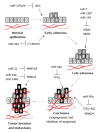MicroRNAs in the prognosis and therapy of colorectal cancer: From bench to bedside
- PMID: 30038463
- PMCID: PMC6054943
- DOI: 10.3748/wjg.v24.i27.2949
MicroRNAs in the prognosis and therapy of colorectal cancer: From bench to bedside
Abstract
MicroRNAs (miRNAs) are small, single-stranded, noncoding RNAs that can post-transcriptionally regulate the expression of various oncogenes and tumor suppressor genes. Dysregulated expression of many miRNAs have been shown to mediate the signaling pathways critical in the multistep carcinogenesis of colorectal cancer (CRC). MiRNAs are stable and protected from RNase-mediated degradation, thereby enabling its detection in biological fluids and archival tissues for biomarker studies. This review focuses on the role and application of miRNAs in the prognosis and therapy of CRC. While stage II CRC is potentially curable by surgical resection, a significant percentage of stage II CRC patients do develop recurrence. MiRNA biomarkers may be used to stratify such high-risk population for adjuvant chemotherapy to provide better prognoses. Growing evidence also suggests that miRNAs are involved in the metastatic process of CRC. Certain of these miRNAs may thus be used as prognostic biomarkers to identify patients more likely to have micro-metastasis, who could be monitored more closely after surgery and/or given more aggressive adjuvant chemotherapy. Intrinsic and acquired resistance to chemotherapy severely hinders successful chemotherapy in CRC treatment. Predictive miRNA biomarkers for response to chemotherapy may identify patients who will benefit the most from a particular regimen and also spare the patients from unnecessary side effects. Selection of patients to receive the new targeted therapy is becoming possible with the use of predictive miRNA biomarkers. Lastly, forced expression of tumor suppressor miRNA or silencing of oncogenic miRNA in tumors by gene therapy can also be adopted to treat CRC alone or in combination with other chemotherapeutic drugs.
Keywords: Apoptosis; Colorectal cancer; Metastasis; MicroRNA; Multidrug resistance; Prognosis; Recurrence; Risk stratification; Therapeutic target.
Conflict of interest statement
Conflict-of-interest statement: No potential conflicts of interest. No financial support.
Figures

Similar articles
-
MicroRNAs: Novel immunotherapeutic targets in colorectal carcinoma.World J Gastroenterol. 2016 Jun 21;22(23):5317-31. doi: 10.3748/wjg.v22.i23.5317. World J Gastroenterol. 2016. PMID: 27340348 Free PMC article. Review.
-
MiR-139-5p as a novel serum biomarker for recurrence and metastasis in colorectal cancer.Sci Rep. 2017 Mar 6;7:43393. doi: 10.1038/srep43393. Sci Rep. 2017. PMID: 28262692 Free PMC article.
-
MicroRNAs in colorectal cancer: role in metastasis and clinical perspectives.World J Gastroenterol. 2014 Dec 7;20(45):17011-9. doi: 10.3748/wjg.v20.i45.17011. World J Gastroenterol. 2014. PMID: 25493013 Free PMC article. Review.
-
Molecular functions of microRNAs in colorectal cancer: recent roles in proliferation, angiogenesis, apoptosis, and chemoresistance.Naunyn Schmiedebergs Arch Pharmacol. 2024 Aug;397(8):5617-5630. doi: 10.1007/s00210-024-03076-w. Epub 2024 Apr 15. Naunyn Schmiedebergs Arch Pharmacol. 2024. PMID: 38619588 Review.
-
MicroRNAs as novel biomarkers for colorectal cancer: New outlooks.Biomed Pharmacother. 2018 Jan;97:1319-1330. doi: 10.1016/j.biopha.2017.11.046. Epub 2017 Nov 14. Biomed Pharmacother. 2018. PMID: 29156521 Review.
Cited by
-
MicroRNA 452 Regulates Cell Proliferation, Cell Migration, and Angiogenesis in Colorectal Cancer by Suppressing VEGFA Expression.Cancers (Basel). 2019 Oct 22;11(10):1613. doi: 10.3390/cancers11101613. Cancers (Basel). 2019. PMID: 31652600 Free PMC article.
-
Potential diagnostic role of circulating MiRNAs in colorectal cancer.Int J Immunopathol Pharmacol. 2023 Jan-Dec;37:3946320221144565. doi: 10.1177/03946320221144565. Int J Immunopathol Pharmacol. 2023. PMID: 36598779 Free PMC article.
-
Functional assessment of miR‑1291 in colon cancer cells.Int J Oncol. 2022 Feb;60(2):13. doi: 10.3892/ijo.2022.5303. Epub 2022 Jan 4. Int J Oncol. 2022. PMID: 34981812 Free PMC article.
-
Overview of microRNAs as liquid biopsy biomarkers for colorectal cancer sub-type profiling and chemoresistance.Cancer Drug Resist. 2021 Oct 26;4(4):934-945. doi: 10.20517/cdr.2021.62. eCollection 2021. Cancer Drug Resist. 2021. PMID: 35582382 Free PMC article. Review.
-
Interaction of Gut Microbiome and Host microRNAs with the Occurrence of Colorectal and Breast Cancer and Their Impact on Patient Immunity.Onco Targets Ther. 2021 Oct 22;14:5115-5129. doi: 10.2147/OTT.S329383. eCollection 2021. Onco Targets Ther. 2021. PMID: 34712050 Free PMC article. Review.
References
-
- Arnold M, Sierra MS, Laversanne M, Soerjomataram I, Jemal A, Bray F. Global patterns and trends in colorectal cancer incidence and mortality. Gut. 2017;66:683–691. - PubMed
-
- Siegel RL, Miller KD, Jemal A. Cancer statistics, 2018. CA Cancer J Clin. 2018;68:7–30. - PubMed
-
- Fearon ER, Vogelstein B. A genetic model for colorectal tumorigenesis. Cell. 1990;61:759–767. - PubMed
-
- DA Silva FC, Wernhoff P, Dominguez-Barrera C, Dominguez-Valentin M. Update on Hereditary Colorectal Cancer. Anticancer Res. 2016;36:4399–4405. - PubMed
Publication types
MeSH terms
Substances
LinkOut - more resources
Full Text Sources
Other Literature Sources
Medical

